Truvia Low Carb Diet
- Overview
- Sugar
- Fructose
- Top 3
- Stevia
- Erythritol
- Monk fruit
- Sugar alcohols
- Maltitol
- Xylitol
- Newer plant-based sweeteners
- Allulose
- BochaSweet
- Inulin-based sweeteners
- Yakon syrup
- Isomalto-oligosaccharide (IMO)
- Synthetic sweeteners
- Acesulfame K
- Aspartame
- Saccharin
- Sucralose
- Deceptive sweeteners
- Diet soft drinks
- Summary
- Similar guides
Can you safely use sweeteners on a keto diet? Perhaps, if you make smart choices. This guide will help you.
To the left, in the green zone, are very-low-carb sweeteners that have generally been shown to have little impact on blood sugar or insulin levels.1 To the right, in the red zone, are sweeteners that significantly impact blood sugar and insulin. Therefore, we recommend strictly avoiding them if possible.
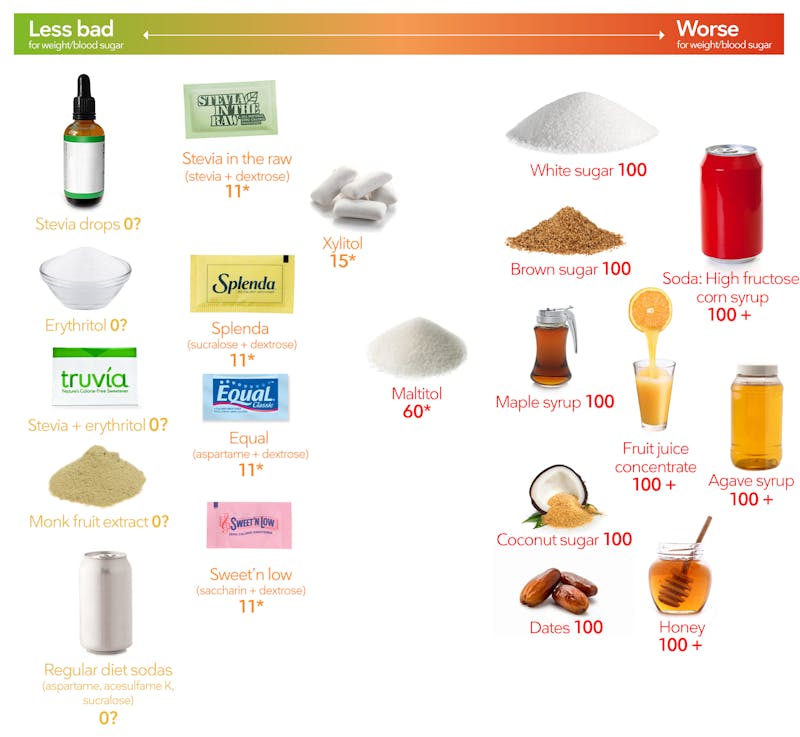
Ratings
The numbers corresponding to each sweetener represent the estimated long-term impact each product may have on blood sugar and insulin levels compared to the same amount of sweetness from white sugar.2 For the purposes of this scale, pure white sugar is defined as having a number of 100.
The question marks by products labeled "zero" represent what is currently known about their impact on blood glucose and insulin response only. These products are relatively new and their full effect on obesity, diabetes, the gut microbiome, and long-term risk for metabolic disease is not yet known. More research is needed.3
Products that have numbers with asterisks reflect that these products contain some carbs, often fillers such as dextrose (glucose) and maltodextrin (concentrated starch).
For example, a Splenda packet provides about the same sweetness as two teaspoons of sugar, which is 8 grams of sugar. The packet contains about 0.9 grams of carbohydrate as dextrose. That's 0.9 / 8 = 0.11 times the effect of sugar, for an equal amount of sweetness. Pure dextrose has a number of 100, so Splenda gets a number of 100 x 0.11 = 11.
The asterisks by xylitol and maltitol reflect that these sweeteners cause a blood glucose and insulin response, although less than sugar does. The number compares that relative response, out of 100, to the equivalent sweetness of white sugar.
If you are trying to stay in ketosis, avoid the sweeteners in the middle and red zone.
Beware: the sweetener snare
The sweeteners to the left above might only have small or even negligible direct effects on weight and blood sugar levels. But for some people they can create other problems.
Here's the potential sweetener trap: eating sweet-tasting foods and drinks may promote cravings for more sweet-tasting treats.4
These low-carb sweeteners are typically added to foods that mimic or replace items that the keto diet eliminates — sugary soft drinks, cakes, muffins, pastries, ice cream, candy, energy bars, and more.
Rewarding yourself with high-carb, high-calorie sweets may have contributed to weight gain and metabolic issues. Yet replacing these with low-carb, high-calorie treats that are easy to overconsume might not be helpful.5 In some people they may also trigger a relapse to non-keto eating.
Even the zero-calorie sweeteners in diet soft drinks may possibly contribute to long-term weight gain and metabolic issues.6
All sweet tastes, whether real sugar or sugar substitutes, act upon the same sweet taste receptors of the tongue and may trigger similar brain neural reward pathways, which according to researchers can maintain sugar addictions and cravings.7 However, this doesn't seem to happen in everyone.8
Moreover, zero-calorie sweeteners' impacts on pregnant women, the developing fetus and young children are unknown and could be potentially risky for long-term metabolic health.9 More research is certainly needed.
All of these reasons are why we at Diet Doctor encourage everyone to carefully consider whether they want to include any sweeteners in their keto lifestyle.
We do understand, however, that using sugar-free sweeteners in moderation can sometimes make sustaining the keto diet much easier for some people.
Like having a glass of wine with dinner, some people may find that having a low-carb cookie or cup of keto hot chocolate after dinner is completely satisfying. Others may need to steer clear of low-carb alcohol or sweets altogether because they can't stop at just one or two.
Fortunately, over time, the keto diet often reduces cravings for sweet-tasting foods in most people. It gets easier to control or ignore cravings; the desire for sweets diminishes.10
If you do want to indulge occasionally, here is what you need to know to make the best choices.
Using sugar as a sweetener

Real sugar comes in many shapes and forms: white, brown, demerara, icing, confectioners', maple syrup, coconut sugar, date sugar, and more.
Sugar is a double molecule of glucose (50%) and fructose (50%). That makes sugar 100% carbs, and all sugars have similar negative impacts on weight gain, blood glucose, and insulin response.11
On a keto diet, sugar in all its forms should be avoided. It will likely impede your progress.
Note that many sweeteners – white or brown sugar, maple syrup, coconut sugar and dates – have a number of exactly 100. This is because these sweeteners are made of sugar. For the same amount of sweetness as white sugar, these sweeteners will have similar effects on blood sugar, weight and insulin resistance.
Worse than sugar: pure fructose
What's likely even worse than sugar? Fructose. That's because it goes straight to the liver and may promote fatty liver, insulin resistance, central obesity, and unhealthy lipid profiles, especially when consumed in excessive amounts.12
Unlike pure sugar with its pairing of glucose and fructose, fructose is much slower to raise blood sugar and is given a lower glycemic index (GI) rating.13 But don't let that low GI rating fool you! Fructose may still do a lot of metabolic harm over the long term — perhaps even more than pure sugar.
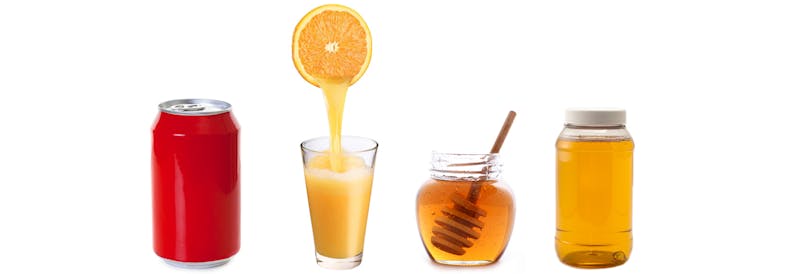
Sweeteners that contain a lot of fructose — high fructose corn syrup, fruit juice concentrate, honey, molasses, agave syrup — are labeled 100+ in our image because of their potential detrimental long-term impact. They could be called super sugars. Agave syrup has the highest fructose content: more than 60%.14
Agave syrup and other high-fructose "healthy" alternative sweeteners are often marketed as being "low glyemic index" because they don't raise blood sugar as much as white sugar does. But they may possibly be an even worse choice than white sugar when it comes to your weight and health due to fructose's adverse effects.15
You are better off not eating any fructose sweeteners on the keto diet, or perhaps at all.
Top 3 keto sweeteners
If consuming sweets from time to time helps you sustain your keto journey, here are our top 3 options:
-
- Stevia
- Erythritol
- Monkfruit
Note: These are not the only "keto-approved" sweeteners. We provide a full list and discussion of other sweeteners in the next section.
Option #1: Stevia
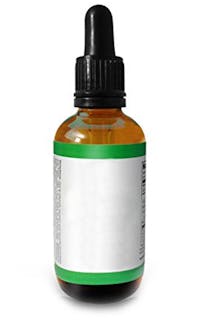
Stevia is derived from the leaves of the South American plant Stevia rebaudiana, which is part of the sunflower family.
Commercial use and marketing of the natural leaves is not permitted in the US. The active sweet compounds, called stevia glycosides, are extracted and refined in a multi-step industrial process to meet with US and European regulatory requirements. Although the FDA has not approved the unrefined leaves, it has designated the refined extract as "Generally recognized as safe (GRAS)."
Pros
- It has no calories and no carbs.
- It does not raise blood sugar or insulin levels.16
- It appears to be safe with a low potential for toxicity.17
- Stevia is very sweet and a little goes a long way.
Cons
- While intensely sweet, it doesn't taste like sugar, and many people find that it has a bitter aftertaste.
- It is challenging to cook with to get similar results as sugar and often can't simply be swapped into existing recipes.
- There's not enough long-term data on stevia to discern its true impact on health of frequent users.18
Sweetness: 200-350 times sweeter than table sugar.
Products: Stevia can be purchased as a liquid, powdered or granulated. Note that granulated stevia products, such as the product Stevia in the Raw, contains the sugar dextrose. Others, like Truvia, contain erythritol and fillers.Check the ingredients label on all stevia products.
Option #2: Erythritol
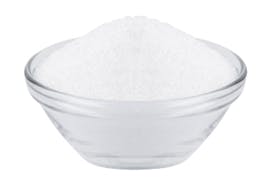
Made from fermented corn or cornstarch, erythritol is a sugar alcohol that occurs naturally in small quantities in fruits and fungi like grapes, melons and mushrooms.
It is only partially absorbed and digested by the intestinal tract. Erythritol is generally recognized as safe by the FDA.
Pros
- It has a negligible amount of calories and carbs.19
- It does not raise blood sugar or insulin levels.20
- Its active compound passes into the urine without being used by the body.21
- In its granulated or powdered form it is easy to use to replace real sugar in recipes.
- It may prevent dental plaque and cavities compared to other sweeteners.22
Cons
- It doesn't have the same mouthfeel as sugar – it has a cooling sensation on the tongue.
- It can cause bloating, gas and diarrhea in some people (though not as much as other sugar alcohols).
- Absorbing erythritol and then excreting it via the kidneys could potentially have negative health consequences (none are known at this time).
We use erythritol in many of our keto dessert recipes because it works well in baking and is well tolerated by most people.
Sweetness: About 70% as sweet as table sugar.
Products: Granulated or powdered erythritol or blends of erythritol and stevia. Read ingredients labels to check for dextrose, maltodextrin, or other additives.
Option #3: Monk fruit

Monk fruit is a relatively new sugar substitute. Also called luo han guo, monk fruit was generally dried and used in herbal teas, soups and broths in Asian medicine. It was cultivated by monks in Northern Thailand and Southern China, hence its more popular name.
Although the fruit in whole form contains fructose and sucrose, monk fruit's intense sweetness is provided by non-caloric compounds called mogrosides, which can replace sugar. In 1995, Proctor & Gamble patented a method of solvent extraction of the mogrosides from monk fruit.
The US FDA has ruled that monk fruit is generally regarded as safe. It has not yet been accepted for sale by the European Union.
Pros
- It does not raise blood sugar or insulin levels.23
- It has a better taste profile than stevia. In fact, it is often mixed with stevia to reduce cost and blunt stevia's aftertaste.
- It is also mixed with erythritol to reduce expense and improve use in cooking.
- It doesn't cause digestive upset.
- It's very sweet, so a little goes a long way.
Cons
- It is expensive.
- It is often mixed with other "fillers" like inulin, prebiotic fibres and other undeclared ingredients.
- Be careful of labels that say "propriety blend," as the product may contain very little monk fruit extract.
Sweetness: 150-200 times as sweet as sugar.
Products: Granulated blends with erythritol or stevia, pure liquid drops, or liquid drops with stevia; also used in replacement products like monkfruit-sweetened artificial maple syrup and chocolate syrup.
Other sweeteners
Below you'll find a complete list of other sweeteners with information about their health and safety profiles, as well as whether they're a good fit for a keto diet.
Sugar alcohols
Sugar alcohols, also called polyols, taste sweet but contain no alcohol (ethanol). Their effects on blood sugar and insulin levels vary depending on the type used. The sugar alcohols listed below have been generally recognized as safe (GRAS) by the US FDA.
Erythritol
A good keto choice; see option 2 above.
Maltitol
Maltitol is made from the hydrogenation of the corn-syrup by-product maltose. Because it behaves in cooking and production very much like pure sugar, it is very popular in commercial "sugar free" products like candy, desserts, and low-carb products. It is also less expensive for food producers to use than erythritol, xylitol, and other sugar alcohols.
We recommend avoiding maltitol on a keto diet. It has been shown to raise blood sugar and increase insulin response.24 Therefore, it is also a potential concern for anyone with diabetes or pre-diabetes. It also has three-quarters of the calories as sugar.25
It is also a powerful laxative. While 50% of it is absorbed in the small intestine, the remaining 50% ferments in the colon. Studies demonstrate that maltitol may cause significant digestive symptoms (gas, bloating, diarrhea, etc.) especially when consumed frequently or in large amounts.26
Sweetness: About 80% of the sweetness of table sugar
Xylitol
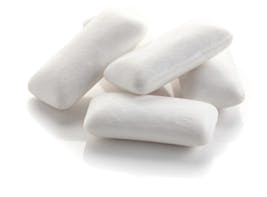
If you chew sugar-free gum, you are usually chewing xylitol. It is the most common-sugar-free sweetener in commercial gums and mouthwashes.
Like erythritol, xylitol is a sugar alcohol derived from plants. It is produced commercially from the fibrous, woody parts of corn cobs or birch trees through a multi-step chemical extraction process. The result is a granular crystal that tastes like sugar, but is not sugar.
Xylitol is low carb, but not zero carb. On a keto diet, it should only be used in very small amounts.
It has a glycemic index of 13, and only 50% is absorbed by the digestive tract.27 When consumed in small amounts, it has a minor impact on blood sugar and insulin levels.28 Xylitol has the same taste as sugar but only half the calories, and can replace sugar 1 for 1 in recipes. It's also been shown to help prevent cavities when chewed in gum.29
However, because only about half of xylitol is absorbed and the rest is fermented in the colon, it can cause significant digestive upset (gas, bloating, diarrhea) even when consumed in relatively small amounts.30
In addition, it is highly toxic to dogs and other pets – even a small bite of a product made with xylitol can be fatal to dogs.31
Although we prefer to use erythritol in most of our dessert recipes, xylitol is included in some of our ice cream recipes because it freezes better.
Sweetness: Equivalent in sweetness to table sugar.
Product: Pure granulated xylitol made from corn cob or birch wood extraction.
Newer plant-based sweeteners
The following sweeteners are quite new and aren't widely available at this time. Moreover, very little is known about their long-term impacts on health because there isn't much research on them.
Allulose
In 2015, allulose was approved as a low-calorie sweetener for sale to the public. It's classified as a "rare sugar" because it occurs naturally in only a few foods, such as wheat, raisins, and figs.
Although it has a molecular structure almost identical to fructose, the body isn't able to metabolize allulose. Instead, nearly all of it passes into the urine without being absorbed, thereby contributing negligible carbs and calories.32
Some studies in animals suggest there may be health benefits to consuming allulose, but human research has been mixed.33 It reportedly tastes like sugar and doesn't seem to cause digestive side effects when consumed in small amounts. However, large doses may cause diarrhea, abdominal pain, and nausea.34
It's also much more expensive than other sweeteners and isn't widely available. Allulose is generally recognized as safe by the FDA.
Allulose is keto-friendly and bakes and freezes like sugar, making it a good option for baked goods and ice cream.
Sweetness: 70% of the sweetness of table sugar
BochaSweet
BochaSweet is one of the newest sweeteners on the market. It's made from an extract of the kabocha, a pumpkin-like squash from Japan. This extract reportedly has the same taste as white sugar, yet because of its chemical structure, it supposedly isn't absorbed and contributes no calories or carbs.
Unfortunately, although it has received great reviews online, very little is known is about its health effects because there are few, if any, published studies on kabocha extract.
Sweetness: 100% of the sweetness of table sugar.
Inulin-based sweeteners
Inulin is a member of the fructans family, which includes a fiber known as fructo-oligosaccharides (FOS). As a fiber, it provides no digestible carbs and isn't absorbed from the digestive tract.
Chicory is the main source of inulin used in low-carb sweeteners and products. It's typically combined with other sweeteners rather than used by itself because it isn't very sweet.
Because inulin is rapidly fermented by gut bacteria, it can cause gas, diarrhea, and other unpleasant digestive symptoms, especially at higher intakes.35 Indeed, many people have reported these symptoms after consuming inulin-based sweeteners. However, inulin appears to be safe when consumed in small amounts and has received GRAS status from the FDA.
Sweetness: About 10% of the sweetness of sugar
Yakon syrup
Yakon syrup comes from the root of the yacón plant native to South America. It is a truly "natural" sweetener, similar to maple syrup. However, like inulin, yakon syrup contains fructo-oligosaccharides, which can cause digestive discomfort.
It has a lower glycemic index (GI) than most other sugars because a portion of the syrup is fiber. Still, one tablespoon of yakon syrup contains some digestible carbs (sugar). Although the exact amount can vary, it's estimated that 100 grams of yacon root contains about 9 to 13 grams of carbs.36
Because yakon syrup is much more concentrated, however, you'll get this same amount of carbs in about 2 tablespoons of yakon syrup. So it isn't a good keto option.
Sweetness: About 75% as sweet as sugar.
Isomalto-oligosaccharide(IMO)
Isomalto-oligosaccharide (IMO) is a type of carbohydrate that is found in some foods in small amounts, including soy sauce, honey, and sourdough bread. Food manufacturers produce IMO by treating the starch in corn or other grains with enzymes to create a sweet, less digestible form of carbohydrate.
IMO is added to sugar-free syrups, bars, and other low-carb or keto treats. IMO carbs are listed as fiber on the nutrition facts label.
Although isomalto-oligosaccharide has been referred to as a "digestion-resistant" starch, research shows that it is partially digested and absorbed into the bloodstream, where it raises blood sugar and insulin levels.37
In small trials, healthy adults experienced dramatic increases in blood sugar and insulin levels after consuming IMO.38
For this reason, we don't recommend using products that contain isomalto-oligosaccharide on a keto or low-carb diet. They likely contain more digestible carbs than their nutrition facts labels suggest.
Sweetness: About 50-60% as sweet as sugar
Synthetic sweeteners
Synthetic sweeteners, often referred to as artificial sweeteners, are created in laboratories from chemicals and other substances (like sugar, in the case of sucralose).
The sweeteners below have been approved for public consumption by the US FDA, which sets an acceptable daily intake limit for each type.39
Acesulfame K
Also known as Acesulfame potassium or Ace-K, this sweetener is one of the most common sweetening agents in flavored water enhancers and sugar-free drinks. It can also be purchased in packets under the brand names Sunett and Sweet One.
Although it contains no calories or carbs and hasn't been shown to raise blood sugar or insulin in most studies, one trial suggested it might raise blood sugar in some people.40 Additional research on its safety has also been advised, mainly based on rodent studies.41
Sweetness: 200 times as sweet as sugar
Aspartame
Aspartame is the most widely used sugar substitute in the US and arguably the most controversial. In addition to being used in many "diet" foods and beverages, it's sold as a sweetener under the brand name Equal (and formerly as NutraSweet).
Pure aspartame contains no calories or carbs and hasn't been shown to raise blood sugar or insulin levels in most studies.42 But sweetener packets of aspartame contain nearly 1 gram of carb each from dextrose.
The FDA considers aspartame safe when used in moderation, but some researchers believe that its safety requires further study.43
Additionally, people have reported side effects from consuming aspartame, such as headaches and dizziness, among others. Although there have been several anecdotal reports of aspartame sensitivity, results from trials have been mixed.44
Sweetness: 200 times as sweet as sugar
Saccharin
Discovered in 1878, saccharin is by far the oldest synthetic sweetener. It is marketed under the brand names Sweet'n Low and Sugar Twin.
While pure saccharin contains no calories or carbs, sweetener packets contain dextrose. It's well known for its bitter aftertaste.
The FDA attempted to ban saccharin in the early 1970s due to studies showing that a high percentage of rodents exposed to extremely large doses of it developed bladder cancer. This association was never shown in humans, however.45
Overall research on saccharin's health effects is mixed, with some studies suggesting it may potentially have negative effects on gut and metabolic health in some people.46
Sweetness: 300 times as sweet as sugar
Sucralose
Sucralose is the sweetener found in Splenda, which has been marketed as the sugar substitute that "tastes like sugar because it's made from sugar." This is true; the sucrose (white sugar) molecule has been modified so that it no longer contains carbs or calories – and is much, much sweeter.
Splenda packets contain dextrose, which does contribute calories and carbs.
Like other synthetic sweeteners, research on sucralose is mixed. Most studies have found that it doesn't have any impact on blood sugar or insulin levels when consumed alone, while others suggest it may increase blood sugar and insulin levels when consumed with carbs.47 In one trial, consuming sucralose was found to increase appetite and intake among female and overweight people, but not among men.48 Effects may vary among individuals, and more research is needed.
Sweetness: 600 times as sweet as sugar
Did you know that some products with labels that identify them as "zero-calorie" sweeteners are almost 100% carbs?
Beware of Stevia in the Raw, Equal, Sweet'n Low, and Splenda packets. They are labeled "zero calories" but they are not.
The FDA allows products with less than 1 gram of carbs and less than 4 calories per serving to be labeled "zero calories." So manufacturers cleverly package about 0.9 grams of pure carbs (from glucose/dextrose and sometimes maltodextrin) mixed with a small dose of a more powerful sweetener.
The labels reel in the consumer and satisfy the authorities. But the packages in fact contain almost 4 calories each, and almost a gram of carbs. On a keto diet that can quickly add up. Don't be conned; don't consume.
Diet soft drinks on keto?
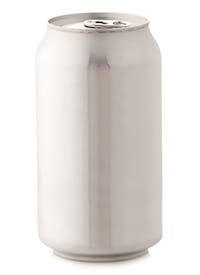
Can you drink diet soft drinks on a keto diet? We recommend you avoid them if possible. Drink water, sparkling water, tea, or coffee instead.
As noted at the start of this guide, regular consumption of sweets, even with no calories, can potentially maintain cravings for sweet tastes.
Consuming diet beverages may also make it harder to lose weight.49 This could be due to hormonal effects, other effects on satiety signals, or effects on gut microbiota.50
What's more, a 2016 study found that most studies showing a favorable or neutral relationship between sugar-sweetened beverages and weight were funded by industry and full of conflict of interest, research bias and unreproduced findings.51
If you must drink diet sodas, though, you will likely still stay in ketosis. Regular soda, sweetened with sugar or high fructose corn syrup, on the other hand, will likely kick you right out of ketosis. Do not consume.
A final word on keto sweeteners
Whether to use sweeteners on a keto diet is an individual choice. Their effects seem to vary from person to person.
For some, the best strategy for achieving optimal health and weight loss may be learning to enjoy foods in their unsweetened state. It might take a little time for your taste buds to adapt, but over time, you may discover a whole new appreciation for the subtle sweetness of natural, unprocessed foods.
However, other people may not lose their taste for sweets. For them, including a few keto-friendly sweeteners may make it easier to stick with low carb as a lifelong way of eating.
Identifying which approach works best for you is key to achieving long-term keto or low-carb success.
Source: https://www.dietdoctor.com/low-carb/keto/sweeteners








Tidak ada komentar:
Posting Komentar